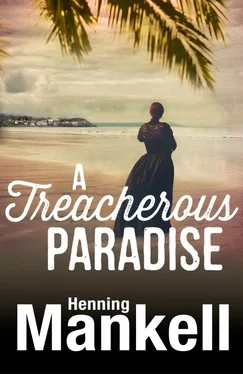They continued their journey back to town when the man at the bridge raised his green flag. Hanna felt a surge of anger when she noticed that the flag was broken and frayed.
She asked to be taken to the promenade to the north of the town. She took off her shoes and walked over the soft sand. It was low tide. Small single-masted fishing boats were bobbing up and down in the distance. Black children were playing on the part of the beach that wasn’t reserved for whites only.
Saving Isabel will be identical with saving myself, she thought. I can’t leave here until I’ve made sure that she gets a fair trial. Only then will I be able to make up my mind what I’m going to do.
She walked along the beach, watching the tide come slowly in. Just now Isabel was the most important person in her life. What happened to Isabel was inseparably linked with herself. She was surprised at how natural and convincing that feeling was. For once in her life, she had no doubts whatsoever.
She was driven back home and paid the chauffeur. That evening she sat at her desk and counted up all the cash she had collected since Senhor Vaz’s death. She would now use some of the money to pay for a lawyer.
Carlos was sitting on top of the wardrobe, observing what she was doing. He suddenly jumped down and sat beside her at the table. He picked up a bundle of notes and began counting them with his long, black fingers, bundle after bundle. Seriously, as if he actually understood what he was doing.
Part Four
The Butterfly’s Behaviour When Faced With a Superior Power
There was still a long way to go before dawn when the woman called Ana and usually referred to as Ana Branca was woken up by a man’s hand touching one of her breasts. For a moment she thought it was Lundmark who had returned from the dead, but when she switched on the light she saw that it was just Carlos who had touched her in his sleep, as if he were feeling for something he’d lost in his dreams. He was woken up by her violent movement. She didn’t know if it was disappointment or merely a feeling of shame at being touched up by an ape, but she pushed Carlos out of bed. He gathered that she was angry and jumped up on to the ceiling light. He sat there, looking at her — she could never decide if those eyes of his were sad or amused.
‘You confounded ape,’ she yelled. ‘Don’t ever touch me again!’
Then she switched the light off. She could hear that Carlos’s concern was gradually fading away, and he was able to relax on the lamp as it swayed back and forth over the bed. She immediately regretted what she had said and done. After all, Carlos was very close to her — like a dog, but cleverer, and just as affectionate. He wasn’t messing her about.
She also thought it was remarkable that the tapeworm Carlos had swallowed didn’t seem to have harmed him at all. Perhaps the stomach juices of an ape are so acidic that a worm able to survive inside a human being can’t live inside an ape’s gut? She had promised Rumigo, who looked after her garden, some extra payment if he would examine Carlos’s excrement to see if there was any sign of a tapeworm. He hadn’t found anything yet, but she was sure he would continue to look — he didn’t dare not to.
Ana used to be called Hanna. She had also lost her previous second name, Vaz. She lost it the same day as the peacock disappeared.
Despite its clipped wings, Judas swore that he had seen it flying away over the rooftops. Hanna refused to believe him, and in a fit of rage threatened to have him beaten if he didn’t tell her the truth. Had he killed the bird and eaten it? Had he plucked off its feathers and sold them as adornments for women’s hats? But Judas was adamant: the bird really had flown away.
It was only when one of the harbour guards on his way home from work swore that he had seen the peacock flying out over the sea that Hanna was forced to accept that it really was the truth. She was living in a part of the world where birds whose wings had been clipped could suddenly recover their ability to fly. It was no more peculiar than the claims about ghostly dogs with no legs or paws roaming the streets at night. Or that tapeworms inside a human being’s stomach could grow to be five metres long.
Hanna thought that it was a premonition. If she wanted to achieve the impossible, she must do the impossible. She must become somebody else.
And so she was now called Ana Branca, nothing else. Ana Branca is a lonely person, she thought. She was losing the respect that Hanna Vaz had enjoyed. Her decision to try to get Isabel absolved from the murder of her husband Pedro had aroused widespread indignation on the grounds that she had failed in her foremost duty — upholding the solidarity of the white race. Defending the status of her own race at all costs.
Ana was unable to go back to sleep. When the first light of dawn illuminated her window, she got out of bed. This was the morning when she was due to meet Senhor Andrade and talk to him about what was likely to happen to Isabel.
Her first thought that morning was the same as the last one she had the day before. It was the image of Isabel in her underground cell in the fort, where a tiny window at ground level was the only way in for the same light of day that Ana could see was now lighting up the sea and the town, the palm trees along the promenade, and the hills marking the border with the African interior. Isabel slept on a bunk with a single blanket and a mattress stuffed with grass. The cell was either freezing cold or so hot that the damp dripped down from the ceiling. During her first weeks in the cell she had a shackle round one of her ankles, but Ana had succeeded in persuading Lima, the commanding officer of the military prison, to have it removed.
Ana intended to visit Isabel later that day. Every time she had to humiliate herself by asking permission from Lima, who usually kept her waiting inordinately long before making a decision. Sometimes he wasn’t even there — or pretended not to be there. Ana always took some food with her, the only thing she was permitted to give Isabel. Only twice had she been allowed to take her clothes. Isabel had been in jail now for two months. She smelled of sweat and dirt every time Ana met her, but Isabel couldn’t use the small amount of water she was given in order to wash herself: she had to drink it. Ana knew that two white men who were imprisoned after beating up and killing a third were treated quite differently. But when she complained to Lima about this, it was as if he didn’t hear what she said. He would look past her, or through her, while absent-mindedly polishing the stripes on his uniform.
Ana Branca is a lonely person, she thought as she stood by the window. She had rebelled against her own race by standing up for Isabel, who was wasting away in the bowels of the fort.
It was nine o’clock when Andrade arrived and handed his white hat and walking stick to Julietta, who made a fuss of him and bowed after escorting him to Ana’s study. Ana and Andrade no longer shook hands: that gesture, which had never been a mark of friendship but had signified respect, was a thing of the past. He sat down opposite her at her desk.
What she wanted to know first of all was if there was a risk that Isabel might be decapitated or hanged. She had asked her solicitor that question several times, but never received a satisfactory answer.
‘The death penalty was abolished in Portugal in 1867,’ said Andrade. ‘In other words, I can’t see any risk of her being executed. I’ve tried to explain that before.’
Ana felt relieved. But could she be absolutely sure?
‘I’ve consulted all the law books,’ said Andrade, ‘and the fact is that nobody is condemned to death any more apart from those found guilty of treason. I’ve also written a letter to the Ministry of Justice in Lisbon, but I haven’t had a reply yet. But I don’t hesitate to say that there are a lot of us who think that the death penalty ought to be reinstated, especially in the Portuguese colonies in Africa. That would force the blacks to refrain from even thinking about committing crimes against white people.’
Читать дальше












